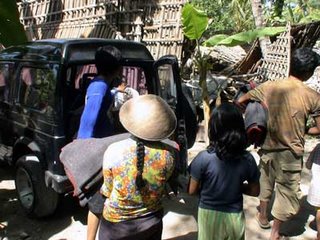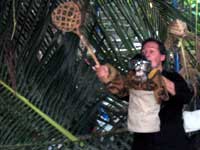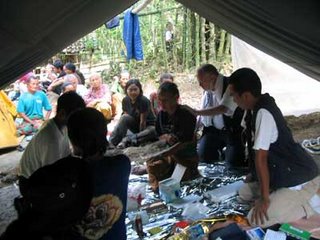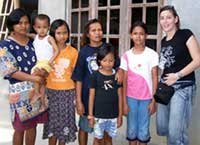BEBEKAN 4
Carrefour, Puppet Show, Photographs of people and of the destroyed houses
 Everything is going forward very well and at a good pace. The villagers don't have any food shortages or problems now. Friday night, I went to the Mercure Hotel where all the NGOs and the press members are staying. I was able to obtain from French firemen who were leaving the country two boxes of medicine which they did not want to take them back with them (200 kg). But all the notices are in French, so my daughter Sarah spent the whole day yesterday translating in Indonesian the prescribed doses of each medicine and classifying the results on a computer. I also met the regional director of Carrefour (Carrefour is a French hypermart which opened recently, in March 206, in Yogyakarta in a new commercial center that has been quite affected by the earthquake).
Everything is going forward very well and at a good pace. The villagers don't have any food shortages or problems now. Friday night, I went to the Mercure Hotel where all the NGOs and the press members are staying. I was able to obtain from French firemen who were leaving the country two boxes of medicine which they did not want to take them back with them (200 kg). But all the notices are in French, so my daughter Sarah spent the whole day yesterday translating in Indonesian the prescribed doses of each medicine and classifying the results on a computer. I also met the regional director of Carrefour (Carrefour is a French hypermart which opened recently, in March 206, in Yogyakarta in a new commercial center that has been quite affected by the earthquake).
Carrefour and the Accor group have delivered thousands of meals to the hospitals of Yogyakarta during the whole week and Carrefour has distributed food in the villages. I wanted to ask its director to offer us school bags and accessories for the children of Bebekan because they are going back to school on Thursday June 8. But he told me he would rather get involved in the rebuilding of a school. So on Saturday morning we went together to see the most damaged school in the vicinity of Bebekan. He seemed interested in pursuing the project and should give me his answer this week.
There is no school in the village itself. The children are scattered in many schools around Bebekan. There are 60 children in all, from kindergarten to high-school, but since they attend the same schools as the children of the five surrounding villages, we must buy school material (notebooks, pencils, school bags) for the whole of the 5 villages, about 250 children, otherwise some understandable jealousy would arise.
 Everything is going forward very well and at a good pace. The villagers don't have any food shortages or problems now. Friday night, I went to the Mercure Hotel where all the NGOs and the press members are staying. I was able to obtain from French firemen who were leaving the country two boxes of medicine which they did not want to take them back with them (200 kg). But all the notices are in French, so my daughter Sarah spent the whole day yesterday translating in Indonesian the prescribed doses of each medicine and classifying the results on a computer. I also met the regional director of Carrefour (Carrefour is a French hypermart which opened recently, in March 206, in Yogyakarta in a new commercial center that has been quite affected by the earthquake).
Everything is going forward very well and at a good pace. The villagers don't have any food shortages or problems now. Friday night, I went to the Mercure Hotel where all the NGOs and the press members are staying. I was able to obtain from French firemen who were leaving the country two boxes of medicine which they did not want to take them back with them (200 kg). But all the notices are in French, so my daughter Sarah spent the whole day yesterday translating in Indonesian the prescribed doses of each medicine and classifying the results on a computer. I also met the regional director of Carrefour (Carrefour is a French hypermart which opened recently, in March 206, in Yogyakarta in a new commercial center that has been quite affected by the earthquake).Carrefour and the Accor group have delivered thousands of meals to the hospitals of Yogyakarta during the whole week and Carrefour has distributed food in the villages. I wanted to ask its director to offer us school bags and accessories for the children of Bebekan because they are going back to school on Thursday June 8. But he told me he would rather get involved in the rebuilding of a school. So on Saturday morning we went together to see the most damaged school in the vicinity of Bebekan. He seemed interested in pursuing the project and should give me his answer this week.
There is no school in the village itself. The children are scattered in many schools around Bebekan. There are 60 children in all, from kindergarten to high-school, but since they attend the same schools as the children of the five surrounding villages, we must buy school material (notebooks, pencils, school bags) for the whole of the 5 villages, about 250 children, otherwise some understandable jealousy would arise.

Pupet Show "Turak"
 I also met in the Mercure Hotel the director of the French Cultural Center of Surabaya. He proposed to invite the French puppeteer Michel Lauber who is now touring Indonesia. It is Michel himself who expressed the wish to do a show in one of the destroyed villages. His group, called Turak, comes from the city of Lyon. So we are organizing for tomorrow, at 4 PM on Tuesday June 6, a puppet show in the ruins of Bebekan. We are inviting the children of all the neighboring villages and at the end of the show we will distribute school accessories and some snacks.
I also met in the Mercure Hotel the director of the French Cultural Center of Surabaya. He proposed to invite the French puppeteer Michel Lauber who is now touring Indonesia. It is Michel himself who expressed the wish to do a show in one of the destroyed villages. His group, called Turak, comes from the city of Lyon. So we are organizing for tomorrow, at 4 PM on Tuesday June 6, a puppet show in the ruins of Bebekan. We are inviting the children of all the neighboring villages and at the end of the show we will distribute school accessories and some snacks.Sunday night. I have organized in my home a meeting between the 15 members of Firemen Without Borders and the coordinator of the young Indonesian volunteers of SAR with whom we are working in Bebekan. FWB are mostly professional firemen who freely donate some of their holiday time to bring assistance in natural catastrophes around the world. They do not only help physically but also they train rescuers and foremen of other countries (notably in Peru). After the Aceh tsunami, they have trained for many months 30 Indonesian firemen who have now reached a high degree of proficiency. Yesterday they were accompanied by 4 firemen from Aceh who came specifically to help the victims of the Yogyakarta earthquake.
Last night the sound of the alarm sirens at the Merapi volcano triggered the evacuation of the villages located within 4 km of the volcano on the eastern side because of the long lava flows and volcanic clouds. We were all in the house and FWB proposed to SAR the idea of long-term training on rescue techniques around the volcano. They must first submit the proposal to all the members of their association and also find the required funds, but from now on we remain in very close contact.
 So this morning they came to Bebekan, One of them is a doctor and he organized a medical visit for all the people still suffering from wounds or other diseases. Meanwhile the other firemen observed how the villagers had started to clear the rubble and demolish unstable walls. They gave them some practical advice and security hints, but in general they estimated that the villagers were working well, even if in an old fashioned way.
So this morning they came to Bebekan, One of them is a doctor and he organized a medical visit for all the people still suffering from wounds or other diseases. Meanwhile the other firemen observed how the villagers had started to clear the rubble and demolish unstable walls. They gave them some practical advice and security hints, but in general they estimated that the villagers were working well, even if in an old fashioned way.They slide a thick strong rope (given to them by one the SAR students) into a hole near the top of the wall and, once the rope jas been knotted, they pull on it and the wall comes crashing down. They work barefoot and bare hand, without masks. FWB gave them all of their remaining masks and today we bought them rubber boots, gloves and more thick ropes. For clearing the rubble, they still use the traditional gotong-royong method, meaning villagers of a village helping each other. All the men of the village decide together each day to clear the ruins of one house. And when that task is done, they move on to the next house. This labor will last many weeks but they work very hard at it. Some women, equally barefoot in the ruins, isolate one by one among the debris the bricks which are still intact and pile them up very delicately on the side : they will be used in the reconstruction. The men also save the beams and the roof tiles, a very detailed and painstaking job.
 The French student volunteers who came in the weekend to Bebekan have photographed all the villagers in front of their house. Their mission in a few weeks will be a bureaucratic battle to obtain from the authorities the aid promised by the government, that is 30 million rps (2,800 euros) per destroyed house. But no one knows as yet how this procedure will be implemented. The Indonesian student volunteers from SAR who are camping in Bebekan will be at the forefront of this battle to help the villagers get this promised aid. Not one of the villagers is a civil servant, they are all peasants without land, agricultural workers or construction workers, or becak drivers. They therefore have no access to the local or national bureaucracy. In fact they haven't to his day received any aid from either the government (except in 11 days 50 kg of rice, 2 bottles of oil and 4 blankets) or foreign NGOs, except for the medical visit organized by FWB.
The French student volunteers who came in the weekend to Bebekan have photographed all the villagers in front of their house. Their mission in a few weeks will be a bureaucratic battle to obtain from the authorities the aid promised by the government, that is 30 million rps (2,800 euros) per destroyed house. But no one knows as yet how this procedure will be implemented. The Indonesian student volunteers from SAR who are camping in Bebekan will be at the forefront of this battle to help the villagers get this promised aid. Not one of the villagers is a civil servant, they are all peasants without land, agricultural workers or construction workers, or becak drivers. They therefore have no access to the local or national bureaucracy. In fact they haven't to his day received any aid from either the government (except in 11 days 50 kg of rice, 2 bottles of oil and 4 blankets) or foreign NGOs, except for the medical visit organized by FWB. Your financial help was crucial and the French firemen were astonished by the progress of this village when compared to other villages they had visited. I therefore go each day to Bebekan, and the Indonesian students brief me on a daily basis about the new needs arising from the situation : electrical cables (hundreds of meters are needed), neon lamp support, etc. I have asked the French and Indonesian students to keep all their notes, photographs and the drawings done by the playgroup children in order to publish a small book on the history of Bebekan, its destruction by the earthquake, its reconstruction, its small-scale financing by a network of foreign friends, the daily work in the field achieved by the SAR volunteers, and the more general history of the village itself, of its inhabitants, of its local culture, and of their myths and traditions.
Elisabeth

0 Comments:
Post a Comment
<< Home